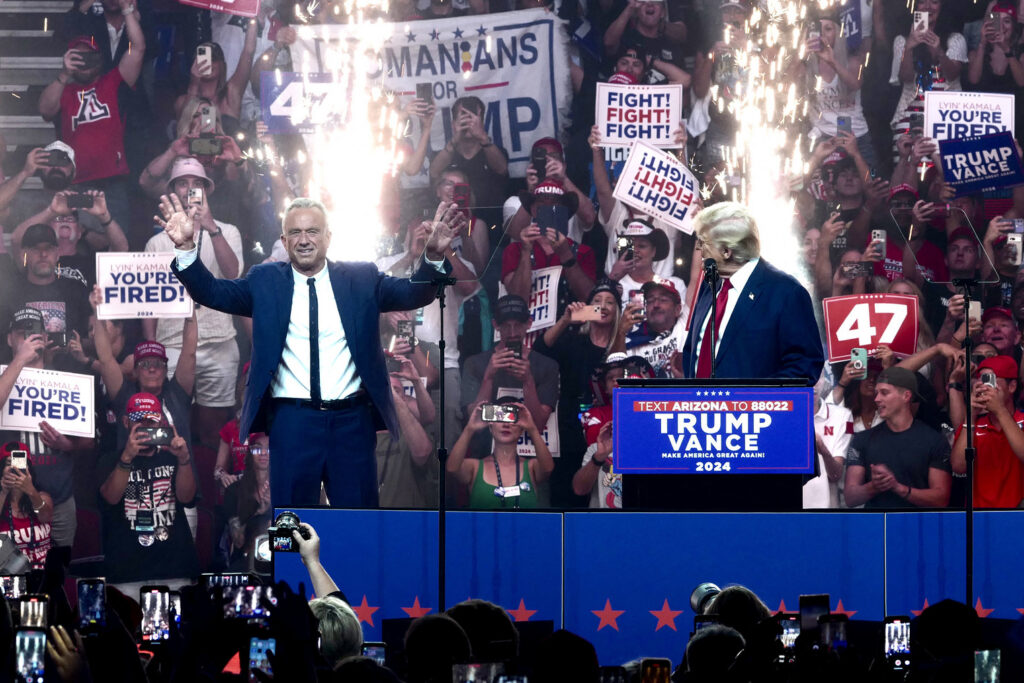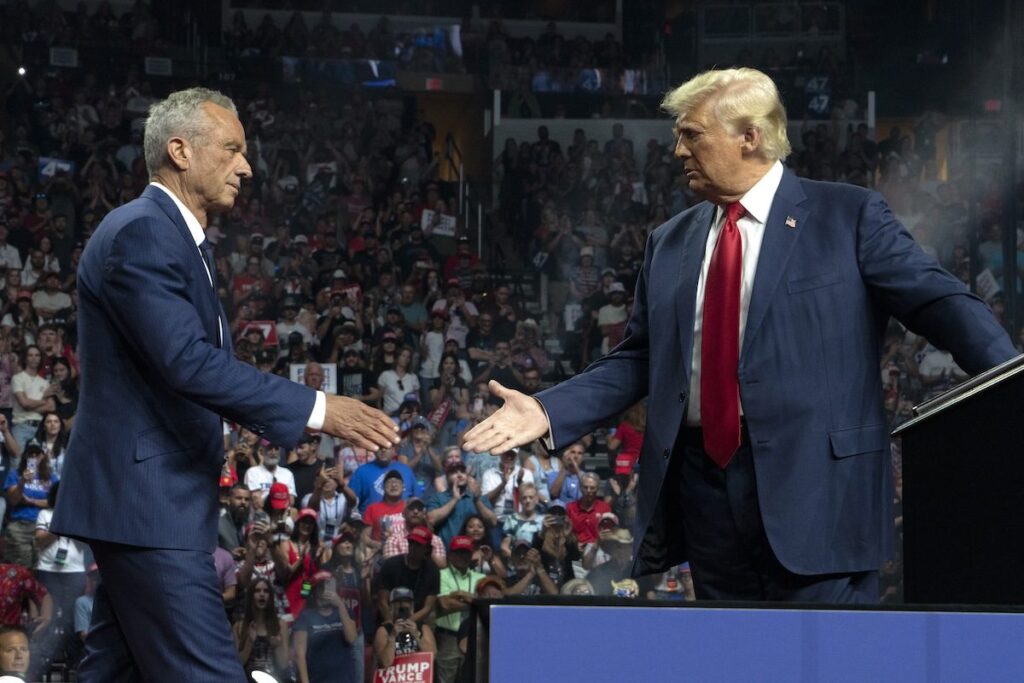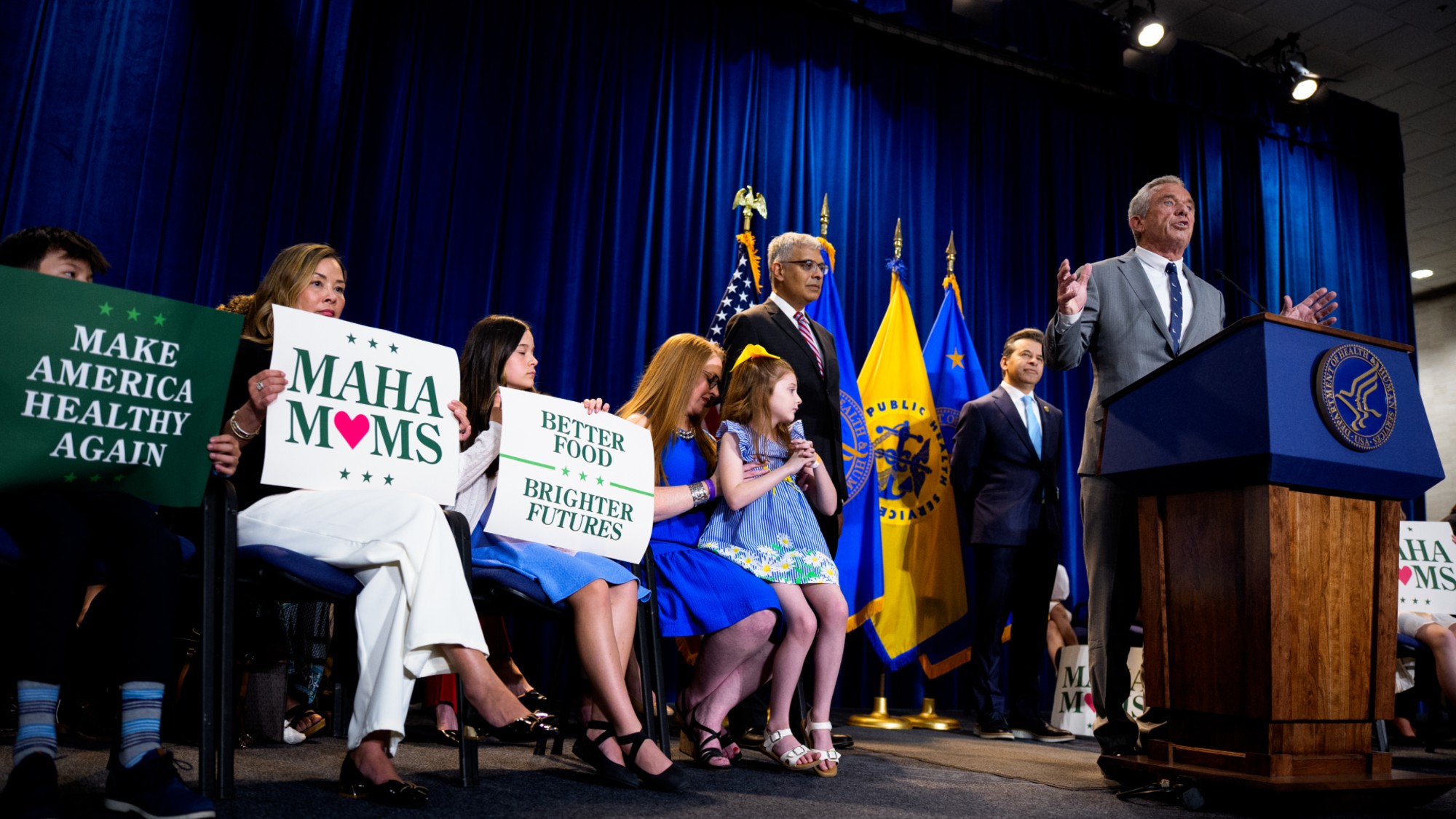A typical day in the life of Katlyn Bevington includes waking up, doing a devotional, homeschooling her kids, and putting them to bed. She seems like a regular homeschooling mom. She is anything but.
Katlyn, also known as @katie.bevington, has over 100,000 followers on TikTok, 92,000 followers on Instagram, and 216,000 followers on Facebook. A self-professed “crunchy mom,” who engages in natural holistic parenting, her interest in medicine started when she was twelve. “My grandfather was in a really bad car accident. It was incredible, it was near-death. I watched these nurses and doctors put him back together, and I thought that was super inspiring.”
Her dreams of becoming a doctor were cut short when she found out she was pregnant with her first child at 19. She pivoted to nursing and became a Certified Nursing Assistant (CNA). She had aspired for a career in medicine her entire life, but quickly began to realize that “most things weren’t as they seemed.” Katlyn claims she was forced to “go around and push vaccines to people and it didn’t make sense.” She says this is the moment when “God changed my life and opened my eyes.” This led her to quit nursing and pursue alternative health practices.
Katlyn started small, by cleansing her household products to fit her new ideals. “At first, it was the big things, like laundry detergent, deodorant, things like that. And then I really started focusing on getting more quality food in the house.” Katlyn went down a rabbit hole about chemicals and unsafe food practices. “After all that, you kind of have a guaranteed awakening.”
While Katlyn’s alternative health journey did not have political origins, her awakening led her to the Make America Healthy Again movement, which inextricably links politics and public health.
In 2024, Robert F. Kennedy Jr. coined the term “MAHA” during his presidential campaign as an independent. In August, 2024, Kennedy suspended his bid for president, and endorsed Donald Trump’s campaign, permanently politicizing MAHA by tying it with the Trump administration.
“I love the entirety of Make America Healthy Again,” Katlyn said, emphasizing that she values and desires honesty from the government and firmly believes that other people want the same. “We want transparency.” As a mother of two, Katlyn falls into the category of concerned parents drawn to the MAHA movement for its promises to keep their children safe. This is the most vocal segment of the MAHA movement, with large online communities such as “The MAHA Moms Coalition” and “Mama Knows All.” But not all MAHA supporters have the same story.
Ava Noe, also known as @cleanlivingwithava, is a senior in high school. She is busy thinking about her personal statement, college tours, and creating content for her 26.2k followers on Instagram. When Ava was thirteen, she “out of nowhere, developed chronic digestive issues.” Ava claimed that her doctors were confused and could not provide a concrete explanation or solution. According to Ava, her condition got so bad that she thought, “I’m not living like this for the rest of my life.” So she turned away from Western medicine and towards changing her diet and lifestyle. This kicked off her journey into alternative health.
Struggling with her condition, Ava decided to start posting on social media to share her story with others. She did not “start with the intention of wanting to have a big platform.” She simply “wanted other teenagers to see [her] as an example and come for advice.”
Ava’s concerns led her to the MAHA movement. “I really appreciate everything the MAHA movement is doing, because I feel like it was something that was just brushed off for so long.”
Katlyn and Ava are not the typical portrait of MAHA supporters. Despite their different backgrounds and journeys, Katlyn and Ava’s reasons for supporting MAHA are remarkably similar: both believe the MAHA movement is uprooting established health practices and doing America a service that should have been done years ago.
Katlyn and Ava are not the influencers being invited to the White House. They do not have large sponsorships or nationally popular podcasts. But they are MAHA’s heartbeat—ordinary Americans attempting to build communities around their dissatisfaction with public health. Their appeal lies in relatability: they are parents, students, and patients who have been disillusioned by the American healthcare system.
Katlyn’s experience with medicine is not limited to her work as a CNA. She is generally suspicious of doctors and critical of the way they treat their patients. “I kept seeing things I was confused about… doctors lying to patients, misconstruing information so the patient wasn’t fully informed of what they were going to endure.” The most poignant example for Katlyn is “someone getting an appendix out and being forced to give them more vaccines…and I would ask my instructor and she’s like ‘that’s just the way it is’.”
Dr. Aimée Shunney, a licensed naturopathic doctor, attributes Katlyn’s perspective to the 1980s and 1990s when the United States started managed care—when healthcare became increasingly organized around insurance networks. She discusses how “these really big corporate conglomerates take over health care,” which created “a situation where your average person is getting an extremely limited amount of time with their doctor.”
The pivot towards managed care in the 1980s created a shift in doctor-patient relationships and American trust in healthcare. According to a poll conducted by The Harris Poll, “trust in people running medicine,” has dropped by 23% since 1973. Healthcare became a consumer good, leading to a loss of humanity in medicine, and a widespread lack of trust between providers and patients. This decades-long situation led to understandable discontent for Americans who felt as though their health needs were not being met or listened to.
Dr. Shunney’s theory is that “the explosion of the internet” meant that people who felt that they could not have a relationship with their doctors, could have “a relationship with a wellness or doctor influencer.” They invest their feelings and time into these influencers because they think, “they see me, they hear me…it’s very attractive, seductive even.”
***

Katlyn originally focused on food substitutes and non-toxic products for children, while Ava focused on gut health and food substitutes for teenagers. But both have since engaged with increasingly political topics: vaccines, food safety, pharmaceutical skepticism, government overreach, and bodily autonomy.
Online wellness culture was not always political. However, as with most things online, wellness culture began to reflect an increasingly polarized political climate.
Molly Ostrander, registered Dietitian and founder of Nutrition For People, believes that a large part of online health culture is based on sensationalism. “As someone who posts online regularly, I understand that if I say ‘here are three things I put in my smoothie everyday to make it a natural multivitamin’ five people are going to like it. If I say ‘here are three things I would never put in my smoothie because they’re poison’ 100 people are going to like it.” Sensationalism attracts attention, and in the digital age, attention is a form of currency.
According to Ostrander, online audiences gravitate towards “easy and understandable soundbites”. Nutrition becoming an increasingly popular topic online means that what was once a small niche became competitive, forcing creators to drift towards the extreme.
Emily Oster, economist and founder of ParentData, agrees with that sentiment. Oster, in an email to The Politic, wrote that part of the reason MAHA is so successful is that “the sound bites are very easy to digest. ‘No food dyes’ is a message that, on face value, sounds very good.” Online segments of the MAHA movement thrive on messages that are universally agreeable at first. Gradually, the content becomes more political.
Katlyn does not believe she engages in sensationalism regarding her content. “I will never post clickbait or anything like that…I don’t even partner with brands that don’t align with my morals,” says Katlyn. While she has posted videos discussing the manipulation of the weather and praising the anti-vaccine movement, to her audience, this is not an act of sensationalism. Indeed, her videos resonate for a reason other than clickbait-y soundbites; they resonate because other people have perceived the same problems for decades.
Dissatisfaction with the government has been a long-standing issue and is often cited as one of the reasons why Trump’s presidential platform was so appealing in 2016.
Regarding public health, during his first term, the Trump administration’s focus on American health was practically negligible. According to Former Secretary of Health and Human Services under Obama, Kathleen Sebelius, Trump’s attempts to repeal Obamacare were the “biggest interest that Trump showed in health policy.”
A transformation came with the COVID-19 pandemic. “I could not believe what I was hearing…I watched while the President of the United States actively gave false information to the American people,” said Sebelius. “During COVID, Donald Trump took public health in a very different direction and began to debate the scientists. But more than that, he began to criticize decisions made by Democratic governors…so public health became a political partisan football.”
This political shift deepened even further with the nomination and election of RFK Jr. to Secretary of Health and Human Services. His nomination was controversial not only because of his family’s longstanding political legacy, but also because of his history as a vocal anti-vaxxer and former environmental lawyer without a background in public health. Many saw this as a political ploy by the Trump administration to leverage the Kennedy name and gain center-right moderate support.
Katlyn has a different opinion. “If people would just unleash the tie to Donald Trump, and release the ties to the blue as well, there would be more of an understanding, but people just get so hot before understanding.”
MAHA, for her, is mostly apolitical. “The politics are relevant but irrelevant at the same time.” She does not view RFK Jr. and the MAHA movement as the Trump administration’s attempt to politicize public health. MAHA is simply an attempt to improve public health, and despite her own Republican affiliation, she believes that MAHA has the potential to exist outside of political parties.
While both Katlyn and Sebelius agree that President Trump is not hands on with RFK Jr. and public health, Katlyn sees this as an opportunity for public health to become bipartisan, whereas Sebelius sees President Trump’s distance from public health as evidence of the administration vying for political gain.
“The President doesn’t have any more interest in health policy than he ever had, he just had an interest in courting somebody named Kennedy and having him flip from a Democrat to a Republican,” said Sebelius.
President Trump’s distance from MAHA poses a large threat to public health policy. “The most salient sentence that Donald Trump has ever said about Bobby Kennedy is ‘I’m going to let him go wild on health’,” according to Sebelius.
***

Katlyn and Ava do have platforms, but in every other way, they are simply ordinary Americans trying to navigate their health. Their support for MAHA has not wavered since the Trump administration and RFK Jr. came into power, and they have continued to post about MAHA since then. Their followers still comment on and like their content; they continue to have brand deals and audiences.
They are certainly not the architects of MAHA, nor are they its loudest voices. But their audiences feel that they are more accessible than doctors or experts. Their feelings are widely understood; they reflect frustration, but also a desire for autonomy of their own bodies and transparency from the government. There are lessons to be learned from Katlyn and Ava’s stories.
Katlyn argues that disrupting the status quo is the answer. It is the through-line for most of her ideas surrounding public health policy and her suspicion of the government as a whole. She believes she is not the only one. “Ultimately, I think that what the movement wants, what anyone would want, is safety.”
Katlyn and Ava’s journeys show that MAHA’s appeal is not just about politics—it is about trust. Trust in healthcare, trust that the government wants to keep Americans safe. MAHA’s rise to the mainstream is a response to a growing number of Americans who feel unheard and underserved by the very systems meant to protect them. MAHA taps into these feelings by offering an alternative—one that for Katlyn and Ava, is an alternative worth fighting for.

